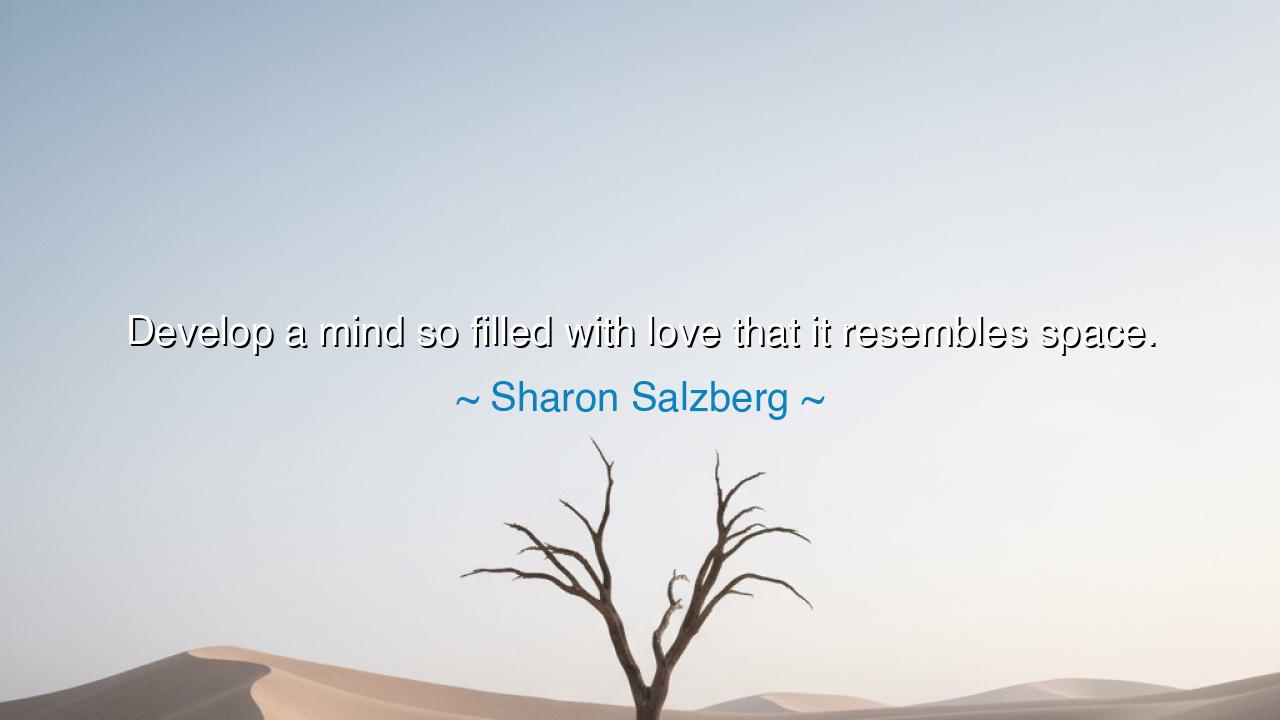
Develop a mind so filled with love that it resembles space.






Sharon Salzberg, the teacher of compassion and pioneer of modern meditation, spoke with words that shine like a lantern in the darkness: “Develop a mind so filled with love that it resembles space.” In this simple yet profound counsel, she points us toward the highest state of being—an inner life vast, open, and limitless, where love flows without boundary, like the sky itself stretching beyond the horizon.
The meaning is both poetic and practical. To develop such a mind is to make the heart as wide as the heavens, able to hold all beings without exclusion. Just as space contains mountains and storms, birds and stars, without resistance or judgment, so too should the loving mind hold friends and enemies alike. It does not cling, it does not reject, it simply embraces all that exists. In this way, love becomes not a fleeting emotion but the very fabric of consciousness itself.
The origin of this teaching is rooted in the ancient practice of metta, or loving-kindness meditation, which Salzberg helped bring from the monasteries of Asia to the restless world of the West. The Buddha himself compared the awakened mind to the sky—unchanging in its vastness, untouched by clouds that drift across it. Salzberg’s words echo this ancient metaphor, reminding us that true love is not fragile or selective, but expansive and enduring, like space itself.
History gives us luminous examples of such minds. Think of the life of Mahatma Gandhi, who endured imprisonment, beatings, and hatred, yet cultivated a spirit so vast in love that he embraced even his oppressors as brothers. His mind was not narrow, not chained by bitterness, but as wide as the heavens, guiding millions toward freedom through nonviolence. Or recall Saint Francis of Assisi, who saw the entire creation—wolves, birds, rivers, and stars—as kin, greeting them with joy and reverence. Their minds, like Salzberg’s vision, resembled space, limitless in compassion.
And what happens when the mind is not spacious? Then anger narrows it, fear constricts it, judgment clouds it. Like a room filled with smoke, it becomes suffocating, unable to hold even the self, let alone others. Wars, hatred, and cruelty are born from such contracted hearts. Yet a spacious mind, filled with love, cannot be poisoned by these forces. It absorbs them as the sky absorbs storm clouds, allowing them to pass without losing its vastness.
The lesson for us is radiant: if you would be free, if you would know peace, cultivate a mind like space. Practice loving-kindness not as sentiment but as discipline. Each day, extend goodwill—first to yourself, then to those you love, then to those you dislike, until all beings are included. This training stretches the heart beyond its habitual limits, until it mirrors the sky itself.
Practical action is this: in moments of anger, pause and breathe as though you are inhaling the vastness of the heavens. In moments of fear, imagine your mind expanding outward, beyond the walls of the room, beyond the city, until it holds the world. In moments of love, do not confine it to one person—let it radiate outward, boundless. Over time, these practices transform the heart into what Salzberg envisions: a mind that resembles space, unshaken, infinite, filled with unending compassion.
So let her words be a torch for every seeker: “Develop a mind so filled with love that it resembles space.” To live this way is to transcend narrowness, to rise above division, to become a vessel of peace. For the sky is never diminished by holding the storm, and the loving heart is never diminished by embracing the world. In such vastness lies freedom, and in such freedom lies the true power of love.






AAdministratorAdministrator
Welcome, honored guests. Please leave a comment, we will respond soon